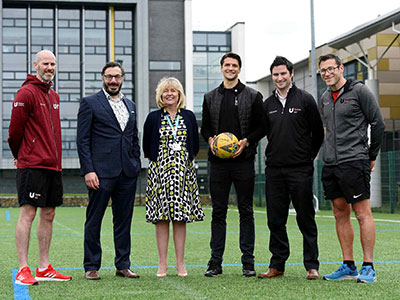Course overview
Many career doors are opened with a history degree in sectors including education, the military (usually as officers), police services, NHS, government, the arts, management and politics. A few have become historians.
History at Teesside allows you to explore a broad range of historical themes and periods such as modern and contemporary European history, the ancient world, social and cultural history, early modern history and modern Irish history. Choose topics along a varied route that match or spark your interests.
You develop an understanding of the nature of historical enquiry, including the relationships between sources, theory and interpretation. You acquire key transferable skills including distinctive critical thinking, verbal and written communication – all highly valued by employers.
Top reasons to study this course
- Satisfied students: we are ranked 9th for student satisfaction for history in the Complete University Guide 2025 (91 institutions were ranked, tees.ac.uk/source).
- Nationally recognised: Teesside University is ranked 7th for History (Guardian University Guide 2025, 84 institutions ranked, tees.ac.uk/source).
- Skills for the future: 100% of history students agreed that their course has developed the knowledge and skills they think they will need for their future (National Student Survey 2024, tees.ac.uk/source).
- North East Film Archive: gain access to the unique on campus North East Film Archive, dating back 130 years, this fascinating collection of material provides an insight into memorable events of the decades, people’s lives and communities.
Course details
Course structure
Year 1 core modules
America: From Watergate, Trump and Beyond
The US is more divided now than it has been for quite some time – or so goes a popular theory. Explore the factors that have led to the current political situation in the US, where republicans and democrats are embroiled in a political struggle and culture war that centres on issues surrounding women’s rights, immigration, healthcare, climate change and science, taxation, the media, the powers of congress, and the presidency. You examine the idea that the divisions among the political elite and most politically active, are mirrored within US society as a whole.
This is a 20-credit module.
Becoming a Historian: Sources, Skills and Contested Histories
The academic discipline of history comprises polarised interpretations, debates, arguments, passions, and struggles to provide the most compelling and most widely accepted explanation of why history happened as it did, and why other futures did not come to pass. Examine two case studies that form one of the most contested areas of historiographical debate. You learn about a crucial period in history and gain a deeper understanding of how the discipline of history works, acquiring skills that will lay important foundations for your future studies.
This is a 40-credit module.
Britain and Europe from 1870 to the Present
Gain an overview of Britain and Europe from 1870 to the present. Take a chronological approach, from the unification of Germany and Italy, through to two world wars, the Cold War and the European Union. Within the British political history strand of the module, you investigate colonialism, the impact of two world wars on British politics and society, the implications of the introduction of the welfare state and Keynesian economic policies during the consensus period, and the shift towards neo-liberal forms of governance and politics in the late twentieth century and beyond. Within the European political history strand of the module, the chronological approach is shared, but you investigate these years with a more international, European focus. Beginning with a study of the major unifications in 1870, the strand investigates, WW1, the emergence of authoritarian and totalitarian dictatorships in interwar Europe, WW2, the Cold War, and post-Cold war military and economic integration.
This is a 40-credit module.
Empire: From the Ancient World to the Americas
For much of human history, empires were the most common form of political organisation. Examine one of history's most important political phenomena and draw comparisons across space and time. Examine empires, from the ancient world to our own day, including analysing the question of whether the current global hegemonic power, the US, should be seen as an empire. Think conceptually, transnationally, and across time, while rooting your studies in concrete historical examples.
This is a 20-credit module.
Year 2 core modules
Future Directions: Research, Careers and Development in the Humanities
Develop graduate skills in preparation for further study, employment or lifelong learning, through engagement with our Student Futures team and humanities practitioners. Gain insight into career pathways and explore the opportunities available to humanities graduates, including as educators, policy-makers, publishers, facilitators, communicators, and creatives. Work on an individual project, either work focused or academic focused.
This is a 20-credit module.
Investigate the history of the North East and Teesside, and gain a deeper understanding of the region, both past and present. Learn about the area’s history, culture, and society through topics such as its foundation, economic development, demographic history, social structure, and political outlook.
This is a 20-credit module.
Revolutionary Change: Mass Movements, Peoples and Cultures
Examine one of the key phenomena of the modern age - revolutionary change - and how this has shaped the modern world. The American Revolution, French Revolution, Russian Revolution, Chinese Revolution, anti-colonial revolutions, Iranian Revolution and the counter-revolutions of 1989 - 1991 have been influential across the globe.
Investigate theoretical approaches to understanding the phenomenon of revolution, the political revolution and change. And research other types of revolutionary change in society such as those in the economic, technological, social and cultural fields. You explore counter-revolutionary resistance and attempts to reverse change as the counter-revolution has been, and remains, key to modern history and politics.
This is a 40-credit module.
You examine the impact of the First World War on the societies of the major participants. And consider how the war influenced social change, either by accelerating or preventing it, and whether any of that social changes had lasting effects.
You work in groups to develop an agreed theme. And you research questions connected to the impact of war on society to enhance your comparative lens.
This is a 40-credit module.
Final-year core modules
Engage in a piece of advanced research into politics or international relations, allowing you to follow a theme or particular interest under the guidance of a supervisor. You are prepared for the workplace, enabling you to apply the skills you have acquired and developed during the course.
This is a 40-credit module.
Build on your skills in using sources and critical engagement with historiography. Under the guidance of experts in the field, undertake in-depth case studies of particular themes and periods in history, with your learning centred on an increased focus and engagement with primary source material. Further develop your own research skills and enhance your capacity to engage in critical thinking, playing a central role into your transition to a capable and confident graduate ready for the world of work or further study.
This is a 40-credit module.
and two optional modules
Through examining primary source material and current historiography, develop an understanding of significant gender-related themes in history. Become conversant in debates on the current status of gender history as an academic discipline and assess its influence in the wider culture. Explore how economic circumstances, work, sex, marriage, motherhood, fatherhood, religion, gender identity, sexual orientation, politics and culture have shaped the human experience and what this tells us about the societies in which humanity has lived.
This is a 20-credit module.
Examine the process by which the past is narrated and analyse the relationship between memory and narratives of the past. Consider the way that memory – individual, collective and public – can be constructed and reconstructed, the processes by which narratives are created and the meanings they can produce. You focus on oral history and narratives, both as a research method and as a means of understanding history.
This is a 20-credit module.
Nazis, Fascists and Anti-Fascists
The victory of the Allies in the Second World War seemed to mark the end of dictatorship. However, the persistence and revival of the extreme right suggests that we're witnessing a rebirth of fascism. Using theory and conceptual approaches, you explore historical and contemporary forms of fascism and anti-fascism, developing a theoretical and historical understanding of the past, present and future.
This is a 20-credit module.
The Troubles: Conflict and Resolution
The politics of the past have been violently contested in Northern Ireland and continue to create problems now. Address the issues that historians and social scientists face when dealing with the politics of a divided society.
You examine the social, economic and political exploration of Northern Ireland at a time of civil conflict, and you explore the development of the conflict. You investigate the international dimension of moving from conflict to a process of peace. Review reports, newspapers, pamphlets, posters, memoirs and TV programmes.
This is a 20-credit module.
Modules offered may vary.
How you learn
The course makes use of a variety of teaching methods including classes, lectures, seminars, tutorials and group work.
How you are assessed
Modules are continuously assessed so that you receive regular feedback to help you improve your skills and abilities. Methods of assessment include essays, critical reviews, small group presentations, bibliographical exercises, primary source evaluation, conventional and seen examinations.
Our Disability Services team provide an inclusive and empowering learning environment and have specialist staff to support disabled students access any additional tailored resources needed. If you have a specific learning difficulty, mental health condition, autism, sensory impairment, chronic health condition or any other disability please contact a Disability Services as early as possible.
Find out more about our disability services
Find out more about financial support
Find out more about our course related costs
Entry requirements
Entry requirements
For entry to the three year programme, a typical offer is 96-112 tariff points from at least two A levels, T level or equivalent, and GCSE grade 4 (grade C) in English.
For general information please see our overview of entry requirements
International applicants can find out what qualifications they need by visiting Your Country
You can gain considerable knowledge from work, volunteering and life. Under recognition of prior learning (RPL) you may be awarded credit for this which can be credited towards the course you want to study.
Find out more about RPL
Employability
Career opportunities
A variety of career paths will be open to you, including law, accountancy, social work, librarianship, journalism, public relations, teaching, retail management and local government work.
Information for international applicants
Qualifications
International applicants - find out what qualifications you need by selecting your country below.
Select your country:
Useful information
Visit our international pages for useful information for non-UK students and applicants.

 BA (Hons) History
BA (Hons) History BA (Hons) History
BA (Hons) History BA (Hons) History
BA (Hons) History

